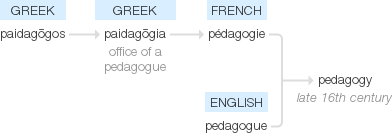Repeat after me: PED-A-GO-GY
Finally I’ve learned how to pronounce the gulp-y-tongue-twister: pedagogy (see video below is you get stuck).
I’ve just finished a week of Radical Pedagogy sessions. These consisted of deconstructing formal learning (education), critiquing traditional pedagogies, introducing critical pedagogies, and making steps towards developing a personal pedagogy of possibilities. In other words we discussed pedagogies a lot.
So to start with it may be good to know what is pedagogy. As I seem to be asked this often when talking about my course with others.
The dictionary tells us:
pedagogy
/ˈpɛdəɡɒdʒi,-ɡɒɡi/
-
the method and practice of teaching, especially as an academic subject or theoretical concept.
and the etymology is Greek:

Use over time for: pedagogy

The role of the pedagogue has changed a lot since the days of antiquity. But surprisingly, not much has changed in the past 100 years. This week we were encouraged to ask questions about the kinds of theories and principles (i.e. pedagogies) that have guided our education systems in the UK since the turn of the century, and we discussed radical and critical pedagogies which challenge the mainstream (more about these later).
The ideas we discussed this week were incredibly challenging. We were faced with questioning our own practices -some of the students are teachers in mainstream schools, and for me as an informal educator, I realized that what I had thought may have been quite radical, actually fit somewhere in the middle ground in to the spectrum of pedagogies. The challenging bit was trying to contemplate change, it is hard to imagine how the radical ideas fit into the work I do, especially within the limited contact time I have in my type of practice.